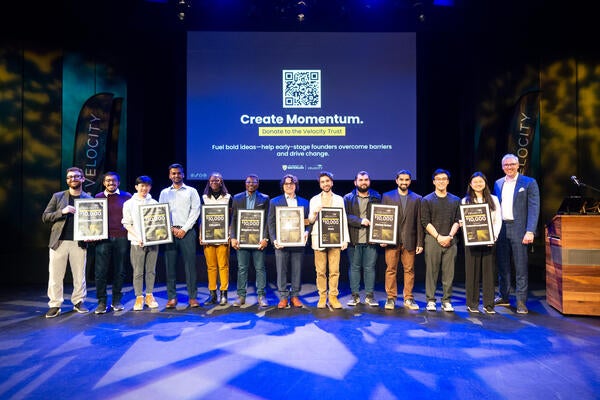
Facing climate challenges with community and hope
Waterloo community gathers for a transformative conversation on healing, resilience and climate change through Indigenous knowledge and action

Waterloo community gathers for a transformative conversation on healing, resilience and climate change through Indigenous knowledge and action
By Faculty of Environment, Waterloo Climate Institute and Office of Indigenous RelationsOn November 14, the University of Waterloo’s Faculty of Environment and Waterloo Climate Institute co-hosted Walking the Path of Hope: Climate Anxiety and the Healing Forest, a thought-provoking event that explored the intersections of climate change, Indigenous healing, reconciliation and Land Back.

Amanda St. Marie, Faculty of Environment Indigenous Initiatives Manager, welcomes attendees to the event and introduces Sophia Armstrong, Dr. Kelsey Leonard and Elder Myeengun Henry.
The event featured Dr. Myeengun Henry, Indigenous Knowledge Keeper in the Faculty of Health and a member of Chippewas of the Thames First Nation, and Dr. Kelsey Leonard, a member of the Shinnecock Indian Nation and a professor in the Faculty of Environment.
Together, they shared their wisdom on critical topics such as land and water stewardship, climate change and well-being during times of change. Their discussion emphasized the importance of reconnecting with nature by remembering and honouring treaties and wampum belts, which outline our shared responsibilities to the land and each other.
Elder Henry and Leonard discussed how Indigenous approaches to wellness — anchored in a holistic view of mind, body, spirit and heart — can help address the intergenerational and ongoing traumas faced by Indigenous communities. From the legacies of Residential Schools and the Sixties Scoop to the impacts of missing and murdered Indigenous women, girls and Two-Spirit People (MMIWG2S), as well as climate change, they underscored the importance of integrating Indigenous knowledge systems into pathways for healing and resilience.

Elder Myeengun Henry sharing Indigenous approaches to wellness and connection to land.
The Healing Forest, a vital initiative within the Waterloo community, took centre stage as a tangible example of reconciliation in action. Once known as the Waterloo Urban Forest, the Healing Forest is a natural area located to the north of campus next to Village 1 residences and was designated a national Healing Forest by the David Suzuki Foundation in partnership with the National Healing Forests Initiative in 2023.
"It is great to come to the University and get a degree," Leonard said, sharing her experience with the students in the audience. "But that is only half of your education. The other half is actually going out and connecting to the land. By connecting to the land, people will develop a sense of love for the land, and what people love, people will protect — that is the idea that brought the Healing Forest to this campus."

Dr. Kelsey Leonard speaking about Healing Forest designation and how the Healing Forest is a space for all to connect, reflect, and engage with nature.
The Healing Forest provides a space for reflection, community building and shared responsibility. It serves as a reminder of treaty obligations, including those rooted in the Haldimand Treaty of 1784, and demonstrates how connections to the land can foster healing and unity.
A central theme of the event was the idea that "We are all treaty people," a call to action for everyone — Indigenous and non-Indigenous alike — to embrace their responsibilities as stewards of the environment. This message resonated deeply as participants reflected on how kindness, humility, love and respect can combat climate anxiety and foster hope amidst rising environmental and social challenges.
Sophia Armstrong, a student in the Knowledge Integration program, skillfully facilitated a conversation with Elder Henry and Leonard, guiding a discussion that charted a path forward rooted in deep connection to the land, water, forests, and community. The event concluded with a powerful reminder: The journey toward reconciliation and environmental stewardship begins with remembering our shared humanity and honouring the responsibilities that come with it.

Sophia Armstrong, a student in the Knowledge Integration program, asks Elder Henry and Dr. Leonard about Indigenous perspectives on climate anxiety and climate change.
The event served as both a call to action and a source of inspiration, highlighting the essential role of Indigenous knowledge in addressing the complex issues of our time. As Waterloo continues its commitment to reconciliation and sustainability, the insights and knowledge shared by Elder Henry and Leonard will guide the community in walking this path together.

Read more
More than 100,000 children and youth from across the region are discovering the wonders of science and technology through the University of Waterloo

Read more
From non-invasive health care solutions to sustainable construction material and AI-driven coaching, the funding supports future-centric ventures

Read more
GreenHouse awards $10,000 to student ventures and changemakers aiming to transform livelihoods within disadvantaged communities
The University of Waterloo acknowledges that much of our work takes place on the traditional territory of the Neutral, Anishinaabeg, and Haudenosaunee peoples. Our main campus is situated on the Haldimand Tract, the land granted to the Six Nations that includes six miles on each side of the Grand River. Our active work toward reconciliation takes place across our campuses through research, learning, teaching, and community building, and is co-ordinated within the Office of Indigenous Relations.